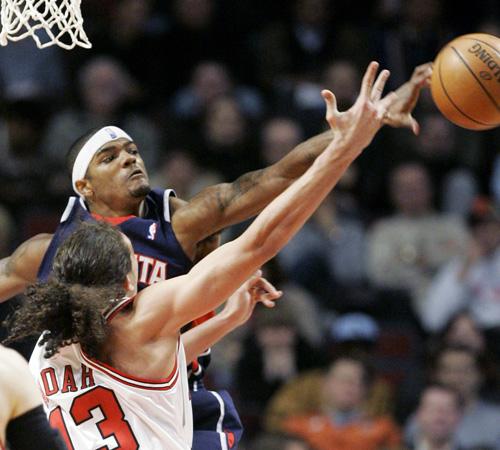Despite win, Bulls struggle to match pre-season hype
Nov 30, 2007
CHICAGO – Kirk Hinrich took off for a breakaway layup, and in a flash, Chicago Bulls fans were letting him hear it.
No, they weren’t cheering.
Hinrich had just passed up a wide-open layup and short-hopped a pass to Joakim Noah during the second quarter of Tuesday’s game against Atlanta, resulting in a turnover, and the fans were venting their frustration.
If one sequence can sum up Chicago’s brutal start, that was it.
The Bulls turned things around and beat the Hawks 90-78 to snap a four-game losing streak. Now, can they turn around their season?
Get The Daily Illini in your inbox!
At 3-10 and with the Eastern Conference’s worst record, the Bulls are in a familiar spot. They overcame slow starts each of the past three years to make the playoffs, and they’ll try to make recent history repeat itself.
“Four years now we’ve been in a similar situation,” Luol Deng said. “We always find a way out of it. You don’t want to be in this situation, but you’ve got to keep playing.”
Even so, this has been jarring.
They’re misfiring from the outside and have no inside game. At 38.6 percent, the Bulls are the only team shooting below 40 from the field, and they’re 29 percent on three-pointers.
It’s no surprise, then, that they are averaging a league-low 86.7 points and are being outscored by 8.3 per game – the league’s second-worst differential.
“I wish I could stand right here and nitpick at a couple things that weren’t going well,” coach Scott Skiles said. “We’ve gotten off to some acceptable starts (in games). But across the board, when you’re 30th in points per game, 30th in field-goal percentage and 30th in three-point percentage … we have to play better offense. Until we do that, it’s going to be hard to get wins.”
Chicago dropped its first nine in 2004-05 and was 4-15 before going on a binge that led to 47 wins and its first playoff appearance since the Michael Jordan era. The Bulls needed a late surge a year later to make it to the postseason, winning 12 of their final 14 regular-season games to finish with 41 wins.
And with high expectations following the arrival of Ben Wallace, the Bulls promptly dropped nine of their first 12 last season before turning things around. They wound up with 49 wins and swept Miami to capture a playoff series, then lost in six games to Detroit in the second round.
There were no major acquisitions in the offseason.
Instead, the most notable moves were the ones the Bulls did not make – contract extensions for Ben Gordon and Deng and a blockbuster trade for Kobe Bryant.
“I think we’re playing with the same fire,” Deng said. “Mentally we’re allowing little things to distract us. And I think sometimes we’re thinking about those distractions too much instead of just keep playing.”
Do those distractions include the trade talks and the Kobe rumors?
“No,” Deng said, shaking his head.
Gordon is averaging 18.1 points, down from a career-high 21.4 last season. A career 41-percent three-point shooter, Gordon is 18-of-65 (27.3 percent) from long range.
Deng hasn’t been quite the same, either, after his best year.
He showed some explosiveness against Atlanta and finished with 22 points in his second game after missing three in a row with back pain. But the mid-range jumper that propelled him to a breakout last season has been mostly missing – in part because teams are taking it away.
He’s averaging 16.0 points and 6.6 rebounds after setting career-highs in every major category, including scoring (18.8), rebounding (7.1) and field-goal percentage (.517).
Hinrich’s struggles are more glaring.
He’s shooting 34.6 percent overall and hitting just 20.5 from the outside. His assist-to-turnover ratio is a pedestrian 1.8, and his 4.7 turnovers per 48 minutes rank 15th in the NBA.
More mind-boggling is what’s happening on the other end.
A second-team all-defense selection by the league’s coaches last season, the Bulls thought he could move up to the first team. Instead, he’s averaging 3.4 fouls and has fouled out of a game. That explains why he’s been playing a career-low 30 minutes, 44 seconds.
“Their talent is not any indication of what their record should be,” Hawks coach Mike Woodson said before Wednesday’s game. “This was a playoff team last year.”






